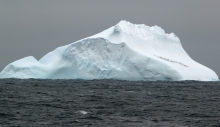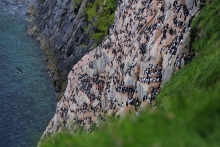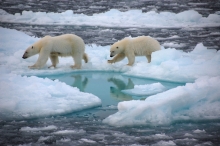Over the past 40,000 years, ice sheets thousands of kilometres apart have influenced one another through sea level changes, according to research published today in Nature. New modelling of ice sheet changes during the most recent glacial cycle by a McGill-led team offers a clearer idea of the mechanisms that drive change than had previously existed and explains newly available geological records.


Vertebrate populations - from birds and fish to antelope - are not, in general, declining. Despite what has previously been thought and said.
[Natural Resource Sciences professor Kyle Elliott, Canada Research Chair in Arctic Ecology, and grad students Allison Patterson and Don-Jean Leandri-Breton are co-authors on this study]
[Co-author Joshua Sterlin is a PhD student in the Department of Natural Resource Sciences at McGill University.]
An increase in cutting in Quebec’s public forests would be a mistake for the forests, the industry, the climate and the regions.
A recent opinion article in the Montreal Gazette (“Shortfall in forest harvest is costly to economy” Oct. 29) called on governments and logging companies to work together to increase cutting in Quebec.

Written by Victoria C. Slonosky

Simultaneous heatwaves and droughts are becoming increasingly common in western parts of the United States, according to a new study led by researchers from McGill University. Periods of dry and hot weather, which can make wildfires more likely, are becoming larger, more intense, and more frequent because of climate change.

While the COVID-19 pandemic continues to overshadow most other topics in 2020, Canadian activists are joining demonstrators around the world to bring climate change back into the conversation. Protests, walkouts, and sit-ins are expected to take place in several Canadian cities, including Vancouver, Ottawa, Montreal, and Halifax, on Friday and Saturday to mark the return of the global Fridays for Future movement led by Swedish activist Greta Thunberg.

Quebec has gone from 13 forest fires on Saturday June 20 to 20 fires on Sunday, including one which is still out of control in Lac-Saint-Jean, and which is heading towards the Saguenay, already ravaging more than 62,396 hectares of forest since last Tuesday. (CTV Montreal)
Here are some experts from McGill University that can provide comment on this issue:

Today, a group of 15 leading universities across Canada, spearheaded by McGill University and the University of Toronto, are uniting to tackle the global challenge of climate change by pledging to follow responsible investment practices. Their efforts are outlined in Investing to Address Climate Change: A Charter for Canadian Universities.

There’s less ice, more capelin and lots of hungry polar bears
Climate change in the eastern Arctic has already altered the travel, diet and safety of some of the most numerous birds in the circumpolar world: thick-billed murres, known as akpait in Inuktitut.
These and other changes are likely to continue, says Allison Patterson, a McGill University graduate student [with Professor Kyle Elliott] who has tracked the habits of these black-and-white birds on Hudson Bay’s Coats Island, known as Akpatordjuark in Inuktitut.

Although non-governmental organizations (NGOs) have become powerful voices in world environmental politics, little is known of the global picture of this sector. A new study shows that environmental groups are increasingly focused on advocacy in climate change politics and environmental justice. How they do their work is largely determined by regional disparities in human and financial resources.

The Arctic Ocean will be ice-free in the summer within the next 30 years, a study says, which will result in "devastating consequences for the Arctic ecosystem," according to McGill University in Montreal. Sea ice is frozen ocean water that melts each summer, then refreezes each winter. The amount of summer sea ice in the Arctic has been steadily shrinking over the past few decades because of global warming. Since satellite records began in 1979, summer Arctic ice has lost 40% of its area and up to 70% of its volume, the Guardian said.

Summer Arctic sea-ice is predicted to disappear before 2050, resulting in devastating consequences for the Arctic ecosystem. The efficacy of climate-protection measures will determine how often and for how long. These are the results of a new study involving 21 research institutes from around the world, including McGill University.

A new study finds volcanic activity played a direct role in triggering extreme climate change at the end of the Triassic period 201 million year ago, wiping out almost half of all existing species. The amount of carbon dioxide released into the atmosphere from these volcanic eruptions is comparable to the amount of CO2 expected to be produced by all human activity in the 21st century.
